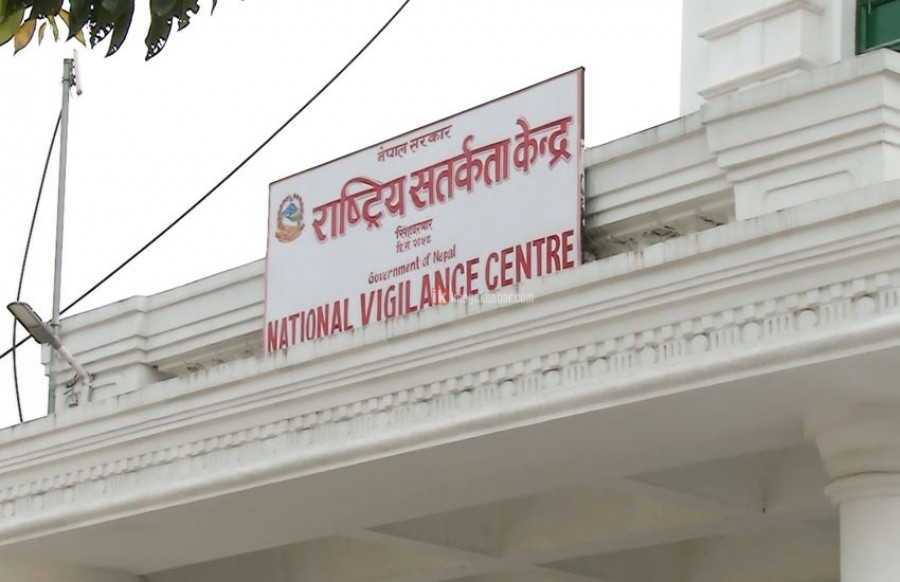National
National Vigilance Centre seeks jurisdiction to investigate improper conduct
But the government has proposed allowing the Commission for the Investigation of Abuse of Authority to probe complaints of such conduct by public officials and fine them.
Prithvi Man Shrestha
The Interim Constitution 2006 had given the Centre for Investigation of Abuse of Authority the authority to investigate “improper conduct” of public officials. But the Constitution of Nepal 2015 has taken away that right from the anti-graft body.
The National Vigilance Centre now wants that authority.
“As there is no agency to look into improper conduct, we have sought jurisdiction to do so as we have been working for long against irregularities and red tape in government offices,” said Hari Prasad Sharma, information officer at the centre. “There can be an arrangement of additional human resources once the task is given to us.”
According to the centre, the authority of investigating improper conduct can be given to the centre by amending the Good Governance ( Management and Operation) Act and its regulation.
The Commission for Investigation of Abuse of Authority Act 1992 categorises several acts of public officials as improper conduct.
They include: refusing to perform duty as per the authority given by law or performing the duty beyond one’s authority; failing to adhere to compulsory working procedures; misusing authority for unrelated objectives; misusing power with malafide intention; forcing other staff to do things unauthorised by law; asking others to do things which come under one's own jurisdiction; making subordinate staff to do work by putting him or her under influence, and misusing power.
“It will help promote good governance provided the task of investigation into improper conduct by the public official is brought under jurisdiction of the centre” states the suggestion of centre in its Annual Report 2019-20 submitted to Prime Minister KP Sharma Oli last week.
The National Vigilance Centre, established in 2002, falls under the purview of the Prime Minister’s Office.
The demand of the agency has come at time when the government already registered the amendment bill to Commission for Investigation of Abuse of Authority Act 1992 bowing to prolonged lobbying by the anti graft body.
As per the bill, the commission can recommend departmental action in the case of the government employees and while it can fine up to Rs50,000 in the case of other public officials if they are found to be involved in improper conduct.
Even though the bill has not specifically mentioned “improper conduct”, activities categorised as improper conduct in existing law have been inserted in it and it can attract action from the commission. The conduct such as failure to follow the compulsory working procedure, asking other staff to perform the duty of own jurisdiction and signing contract without site clearance in development works have been brought under the jurisdiction of the commission in the bill.
The authority to investigate into “improper conduct” had been removed from the jurisdiction in the new constitution amid complaints that the anti-graft body practically worked as executive of the state when it was headed by Lok Man Singh Karki, whose appointment was nulled by the Supreme Court in January 2017.
Article 120 of Interim Constitution said: Functions, duties and powers of the Commission for the Investigation of Abuse of Authority: (1) The Commission for the Investigation of Abuse of Authority may, in accordance with law, conduct, or cause to be conducted, inquiries into, and investigations of, any abuse of authority committed, through improper conduct or corruption by a person holding any public office.
But former chief commissioner of the commission Surya Nath Upadhyaya said that it was the right step to enable the commission to investigate improper acts of the public officials.
“Even when the constitution has taken away the jurisdiction of the commission to investigate improper acts, it can be enabled to investigate such acts through the law,” he said.
Regarding the demand of the National Vigilance Centre to provide it jurisdiction of investigating the improper, he said that the centre was unfit to investigate improper acts.
“In my view, the country does not need the National Vigilance Centre,” he said. “ In our country, nobody listens to the institution that does not have the authority to penalise. And its performance so far is not up to mark and it should be scrapped.”
He said that there should be legal provision regarding how to penalise public officials as per the recommendation of the commission.
“In the past too, the commission’s recommendations regarding taking action against unruly public officials were not properly implemented due to the lack of clear legal provision to take action against the public officials who engaged in improper acts,” Upadhyay said.
But, Srihari Aryal, senior advocate and anti-corruption campaigner has a different view. “The primary responsibility of preventing corruption lies with the prime minister and the agency under it should be empowered to do so. The commission should focus on investigating large corruption cases while the task of preventive measures should rest on the prime minister,” he told the Post.
Aryal was a member of the committee headed by former lawmaker Mahadev Yadav which had suggested the establishment of the centre.
Aryal, however, said that the centre should be headed by a minister-level official instead of the current provision of secretary running the organisation. “In order to investigate improper conduct, the secretary heading the centre won’t work,” he said.
Currently, the major task of the centre is to collect complaints about irregularities and red tape in public offices; regulate the government agencies to ensure prompt service delivery; monitor the properties of the public officials; conduct technical audit of development works; monitor presence of the public officials in their respective offices among others.




 9.51°C Kathmandu
9.51°C Kathmandu














